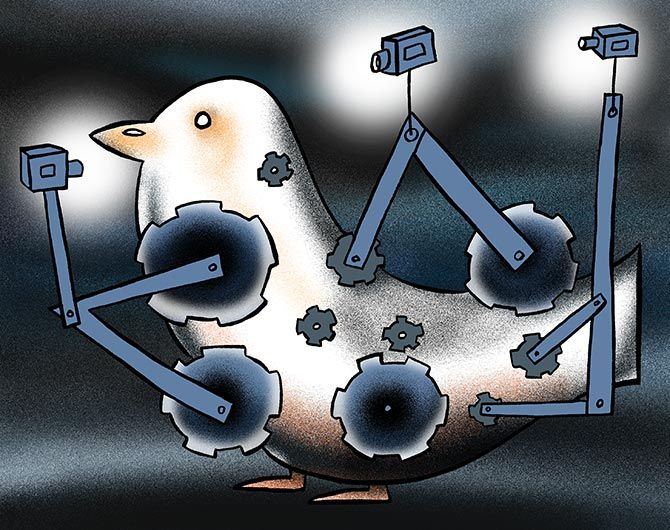 | « Back to article | Print this article |
'It's amazing that a country that claims to be the world's largest democracy is getting into the business of micro-regulating personal and professional lives in this fashion,' says Devangshu Datta.
Illustration: Uttam Ghosh/Rediff.com

There's an old joke about a madman obsessively banging his head against a wall. When a bystander asks why, the madman responds, 'It'll feel so good when I stop doing it.'
Demonetisation was like that.
Months of pain and privation gradually eased, as cash came back into the system.
There was immense relief as one could indulge in the civilised niceties of tipping the bellboy at a hotel, or simply eat an ice cream on the street.
This process of pain followed by cessation leads to 'normalisation': People are gradually trained to endure situations they would have previously considered unacceptable.
Last month, for instance, ATMs across the country ran dry. If this had happened prior to November 8, 2016, there would have raucous complaints.
Now, there are just a few mutters and grumbles. Welcome to normalisation.
Looking back, the past three years have seen an amazing amount of such normalisation.
There was uproar over 'Ghar Wapsi' in 2014, which translated to couples being harassed in public by mobs.
Back in 2015, there was uproar when a man was lynched by a mob in Dadri for allegedly eating beef.
The prime minister even bestirred himself to make a speech (many, many months after the Dadri incident), condemning the concept of cow-vigilantism.
Two years later, vigilante mobs are roaming around several states. Several persons have been lynched for random reasons supposedly involving bovines. 'Anti-Romeo' mobs have thrashed and publicly humiliated young couples.
Meanwhile the PM is emulating his illustrious predecessor in that post and maintaining a dignified silence about mob rule.
Normalisation.
India has a long history of disastrous experiments with prohibition. When Bihar went dry in fulfilment of an assembly poll promise, people shook their heads at this re-enactment of known folly.
When Bihar promulgated a ridiculously draconian anti-liquor law, people shook their heads again.
Now, several other states are contemplating going dry and nobody is saying much.
Normalisation.
In the meantime, the Supreme Court decreed that liquor will not be sold within 500 metres of a highway. A million jobs will be lost as a result and every state will forego massive sums in revenue.
Plus, of course, a new parallel economy will develop in getting around this partial prohibition.
No one seems to be prepared to point out the adverse effects.
Normalisation again.
After demonetisation, several other crackpot schemes also seem to be on the anvil.
For example, there is a proposal to shut petrol pumps on Sundays to conserve fuel. One look tells you this will just mean long queues at pumps on Saturdays and Mondays. But nobody is calling this out as the absurdity it is.
Normalisation.
Another mad idea is that of asking restaurants to state exactly what is served in a given portion.
Restaurants already comply with multiple strange rules and this adds another one to the mix. It could lead to endless nitpicking.
Say, a menu claims there are 'X cubes of diced meat' in a portion of goulash. Well, how large are the cubes? Are the portions always counted out exactly? Etc.
Instead of ridicule, this proposal has drawn sighs of relief that the government does not, as yet, intend to lay down laws stipulating quantity.
Normalisation.
This sort of nonsense generally occurs only in madly totalitarian regime like Pol Pot's Cambodia, and North Korea.
Sane totalitarian regimes such as the Soviet Union, Deng Xiaoping's China and smart nanny States such as Singapore allow people a great deal of latitude in personal life.
It's the basis of an unspoken quid pro quo: Eat what you like, drink what you like, sleep with whoever.
Just don't get political.
It's amazing that a country that claims to be the world's largest democracy is getting into the business of micro-regulating personal and professional lives in this fashion.
It's also instructive to see how much of this absurdity has been normalised, given that the ruling dispensation was supposedly committed to 'Minimum government, maximum governance' three years ago.
DON'T MISS INTERVIEWS in the RELATED LINKS BELOW...